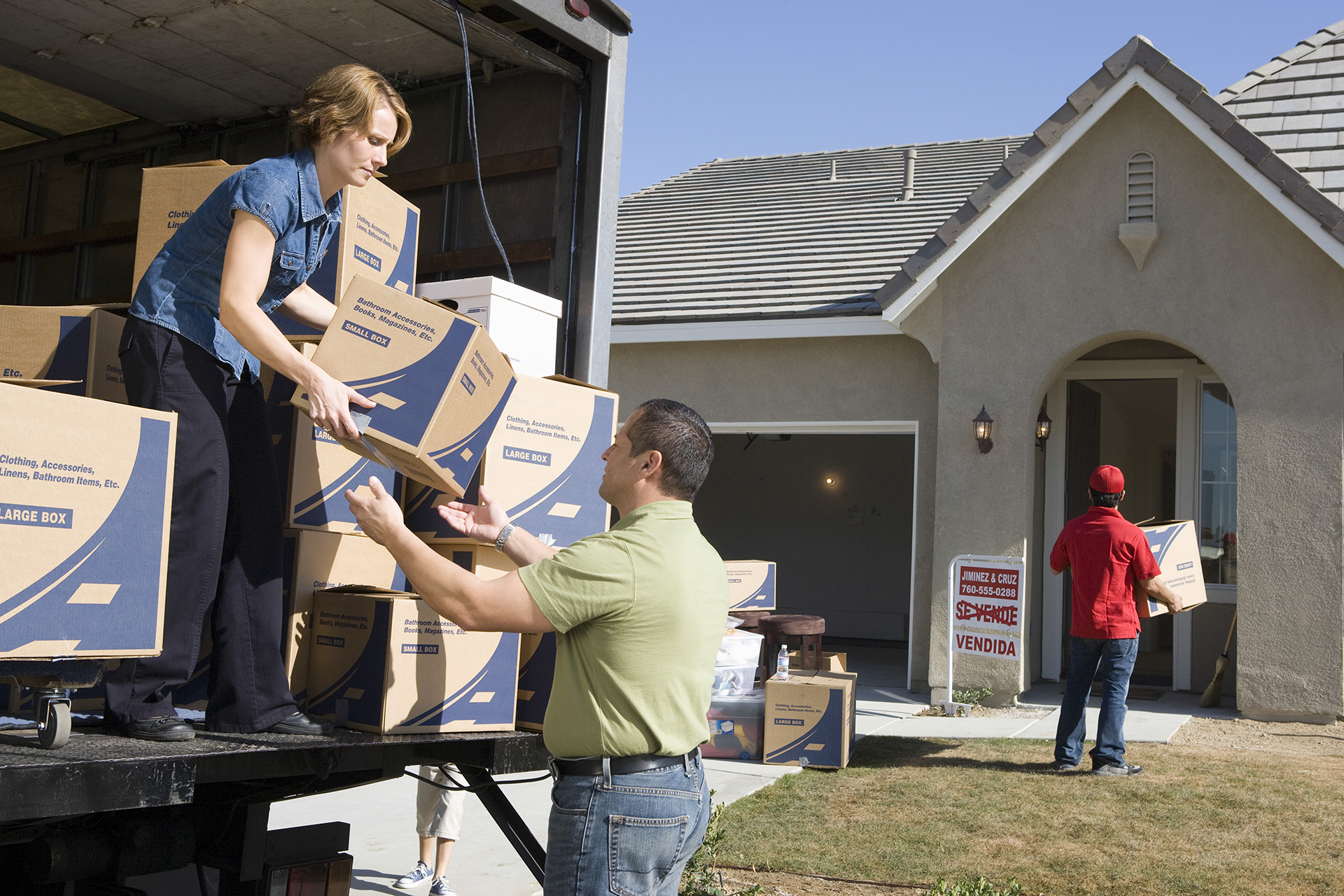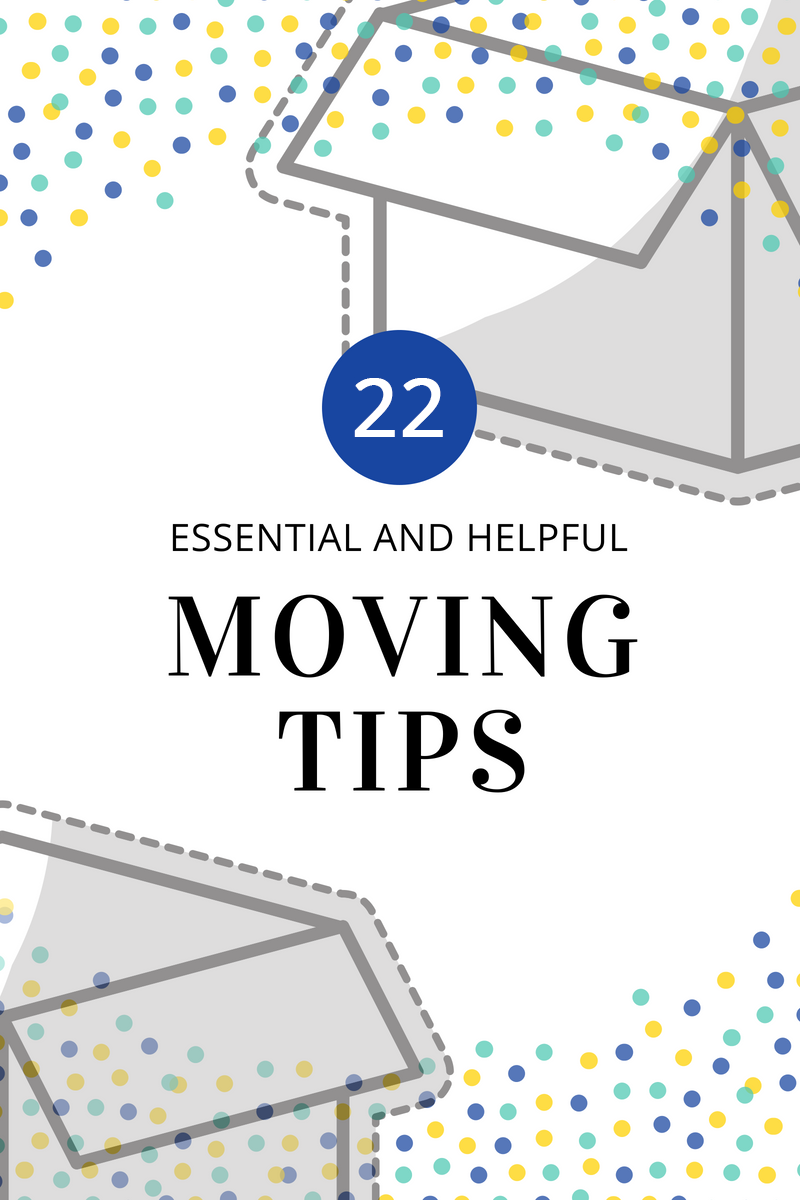23 Moving Hacks
Do you want to know how to pack and move fast? Are you interested in ways you can make moving easier and less stressful? If that’s the case, some of these moving tips might alter the way you approach moving for the better.
Take some time out to familiarize yourself with these clever moving tricks, hacks and organization ideas that can set the tone for your move.
PREPARING FOR A MOVE

1. Create a moving checklist and budget.
First, draft a moving checklist that includes a timeline. Everyone’s timeline will look different depending on how much notice is given before the move. Some people will have two months and others might have two weeks. Next, include a realistic moving budget.
By visually organizing your move, you can keep a handle on events as they unfold. Not sure where to start? Print out our comprehensive moving checklist and put it inside a designated moving binder.
2. Weigh the pros and cons of hiring professional movers.
If you don’t have access to willing family and friends or you are moving to another state, it might make sense to hire professional movers. The amount of work they take off your plate during this stressful time might be well worth the added cost.
Hiring professional movers can be a great experience—if you hire the right company. Don’t be afraid to ask questions before signing a contract. This due diligence will give you peace of mind as moving day approaches.
3. Send out notices before you’re stressed.
Make a list of who you need to notify when you move. There are a lot of loose ends to tie up before you move to a new area. You should determine when and how you will accomplish these tasks in your moving checklist. When the time comes, either visit offices locally or be prepared to make some phone calls. By making this list in advance and setting the task for yourself in your calendar, you’re less likely to forget anyone.
PACKING TIPS AND TRICKS

1. Declutter so you can pack less.
A crucial packing tip is making sure you don’t move anything that you no longer need. Lighten your stress and workload by decluttering before you enter the packing stage, which means figuring out what to toss, keep, sell, or donate. Take measurements of your new home and get rid of any furniture that won’t fit or you know you won’t use.
2. Invest in quality moving boxes.
It’s tempting to go to your local grocery store and try to score some boxes for free. However, moving boxes are relatively inexpensive, and the added durability can be worth the cost in the end.
Grocery boxes and reused moving boxes can be compromised due to wear and exposure to moisture or worse, a bug infestation. The last thing you want is a box falling apart in your hand while you’re trying to move it into the house.
3. Set a timer and pack for an hour a day.
Don’t bite off more than you can chew. When it comes to packing, break down your packing into steps. If you procrastinate and try to pack everything the night before, you’ll likely become overwhelmed with stress.
Tackle one room at a time and spend an hour each day packing up items into boxes. Pack pairs or sets together and make sure your box is the appropriate size to hold a complete set of belongings.
4. Pack a moving essentials tote.
When you first move into a new home, it’s unlikely the first thing you’re going to want to do is to unpack clothes, do laundry, and go grocery shopping. Moving can take a lot out of your family, which is why creating a moving essentials tote ahead of time is tremendously helpful.
5. Give each room a different color packing label.
To stay organized, print off multi-colored packing labels or use different colored masking tape and give each room its own color. Label the contents of each box and include the room it belongs in. Then in your new place, use colored tape to mark entrances to rooms. This moving tip will save movers a ton of time. Instead of needing to read the label explicitly or play the room guessing game, they can just match color to color.
6. Don’t overpack a moving box.
One mistake a lot of people make when moving is trying to cram all of their belongings into a few cardboard boxes they have around the house. Use as many boxes as you need to create easy-to-lift loads. Keep your largest boxes to no more than 50 pounds.
7. Use the right size boxes.
Place heavy items like books, in small boxes, and lighter items in larger boxers. This makes it easy for movers to organize and pack boxes into the moving truck. Be sure to pack heavier items on the bottom and lighter items on the top to avoid damaging breakables.
8. Don’t leave empty spaces in boxes.
Fill in any gaps with packing paper, clothing or foam peanuts to prevent items shifting around during the move. Use tape to close the bottom and top seams and around the edges where stress is concentrated.
9. Bundle the breakables.
For any fragile items you pack, use plenty of bunched-up paper and padding. Never place these items in boxes freely without some extra cushion. Spend the time packing these items correctly to save you stress in the long run.
Read Also: How to Pack China for Moving to Avoid Breakage
10. Repurpose household items for packing.
Think about how you can repurpose things you have — like hampers, suitcases and laundry bins for storing some of your clothes and household items. To help take up as little space as possible, use vacuum sealing for your clothes.
11. Save space when packing clothing.
Clothing can be one of the most time-consuming elements of packing. The important thing is to save as much space as possible with clothes because excess clothing can take up most of the moving truck if you’re not careful.
Space-saving packing hacks for clothes:
- Pack hanging clothing in garbage bags by cutting a hole on top of the bag then placing the garbage bag over a grouping of hangers.
- Roll clothing instead of folding to save space.
12. Label and take photos of furniture parts and accessories.
Take the extra time to protect larger pieces of furniture before you move. Remove and secure all drawers and doors beforehand. Also, label cables, drawers, doors, and anything you need to remove so you know where it goes when you put it back together. Put screws and bolts into plastic bags and tape these to the back of the furniture.
When packing up electronics, take a photo of the back configuration so you remember which cord goes where. Take photos of any furniture you take apart to serve as a guide for putting it back together. Also, make sure you label doors, screws, and anything else you take apart.
13. Use wool string to open boxes easier.
Create a pull tab that you can use to open moving boxes without scissors or box cutters. Simply place a piece of wool string on the center of the closed box flaps, leaving excess on the sides. Tape over the string and seal the box with moving tape, but be sure there is a small piece of string left not taped on the end.
14. Don’t pack these items with other household belongings.
Consider what should not be packed in the moving truck. Some things can be hazardous during the moving process, so it is best to move them separately or dispose of them before moving.
Tools, painting equipment and cleaning chemicals should be packed together in clearly marked boxes. You may want to use plastic totes to prevent messy or dangerous leaks. Pack bottles and medications together and keep them separate from other belongings.
Other items to pack separately:
- Fire Extinguishers
- Ammonia
- Chlorine granules
- Heating agents like Sterno
- Paints and varnishes
- Auto batteries
15. Stock up on packing material for the kitchen.
Consider packing everyday dishes, bakeware, Tupperware, and silverware separately. Crumpled newspaper, bubble wrap or corrugated cardboard will help prevent your fragile items from breaking, but just about anything can be used to pack breakable items. Utilize dish towels and even paper plates to create buffers.
Remember, crystal, china, ceramics, and keepsakes need to be carefully packed with lots of padding. Pack these items in smaller boxes with appropriate packing materials and labeled as fragile.
16. Use plastic wrap to avoid leaks.
Take care of anything that has the potential to spill. For instance, a shampoo bottle that seems tightly sealed outside of a box can somehow magically figure out a way to ooze over all your other belongings. In this case, keep all toiletries and liquids separate from dry items. Also, consider using plastic wrap as an additional seal between the bottle and the lid.
17. Use straws to keep jewelry from knotting.
Avoid knotted, tangled and broken jewelry by taking extra care of these items. Place your necklaces through straws to keep the chain from tangling, or lay them flat on a small towel and roll it up. Use a plastic pill case to organize and transport your extra small jewelry like rings and earrings. Consider keeping these valuables with you and not on a moving truck.
ADVICE FOR MOVING DAY

1. Create a game plan.
To avoid a hassle, make sure you have someone who can direct the movers on moving day. This person needs to determine which items need to be moved first, and which items can be loaded into your new home last. Having a general direction and someone who can take charge can save you time on moving day, which will, in turn, save you money if you’re using professional movers.
2. To save time, don’t rush.
It might seem counter-intuitive, but moving fast means taking your time. Don’t rush throwing things onto the moving truck without thought behind it. This mistake could be timely if things get damaged or something is forgotten. You’ll also feel a lot more stress if you’re rushing around. Be diligent but don’t rush.
Read Also: How To Load & Drive a Moving Truck
We hope these moving tips help steer your move in the right direction. Are there any tried-and-true moving tips that we missed? Let us know in the comments below!


Leave a Reply
Want to join the discussion?Feel free to contribute!